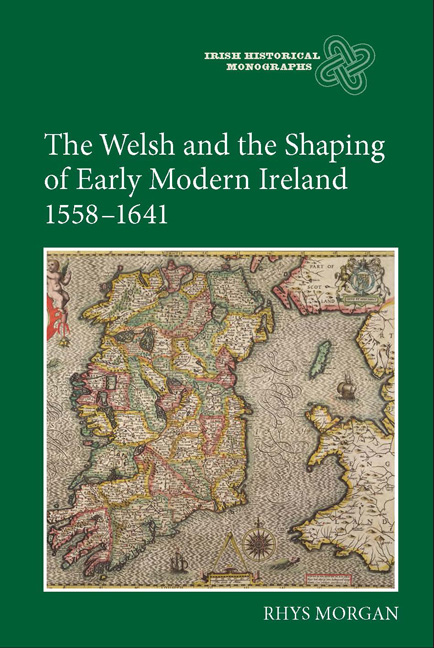Book contents
- Frontmatter
- Dedication
- Contents
- List of illustrations
- Acknowledgements
- Abbreviations
- Introduction: Locating the Welsh in Ireland and Britain during the early modern period
- Part I From soldier to settler
- Part II The New Welsh
- 4 A colonial community? Kinship and cooperation among the Welsh in Ireland, 1558–1641
- 5 A ‘ragged Welch companie’: difference and identity within the New English community
- Conclusion
- Appendices
- Bibliography
- Index
4 - A colonial community? Kinship and cooperation among the Welsh in Ireland, 1558–1641
from Part II - The New Welsh
Published online by Cambridge University Press: 05 November 2014
- Frontmatter
- Dedication
- Contents
- List of illustrations
- Acknowledgements
- Abbreviations
- Introduction: Locating the Welsh in Ireland and Britain during the early modern period
- Part I From soldier to settler
- Part II The New Welsh
- 4 A colonial community? Kinship and cooperation among the Welsh in Ireland, 1558–1641
- 5 A ‘ragged Welch companie’: difference and identity within the New English community
- Conclusion
- Appendices
- Bibliography
- Index
Summary
Having established the composition and nature of Welsh involvement in early modern Ireland, the second part of this book moves on to argue that the Welsh formed a distinctive group within the New English community. This challenges the prevailing historiographical tendency to present the New English as a cohesive and monolithic interest. This chapter considers the Welsh in Ireland as a community. It is argued that Welsh men and women in Ireland cooperated in informal networks sustained by kinship ties and political and social allegiances formed in Wales. Migrants also often demonstrated a sense of loyalty to fellow Welshmen. The chapter maps the ties of correspondence, economic interaction and marriage that linked Welsh individuals in Ireland to one another as well as with their countrymen in Wales. It is shown that Welsh involvement in the conquest, settlement and administration of Ireland produced a Cambro-Hibernic community possessing close links with Wales but remaining an integral part of New English society. The final chapter builds on this by assessing the extent to which Welsh migrants were regarded as separate from English settlers, and whether they developed a distinctive identity in Ireland. Contrary to prevailing historiographical orthodoxy, it will be demonstrated that experience of the conquest and colonisation of Ireland, particularly after the 1580s, emphasised ethnic difference within the New English community.
- Type
- Chapter
- Information
- The Welsh and the Shaping of Early Modern Ireland, 1558–1641 , pp. 107 - 130Publisher: Boydell & BrewerPrint publication year: 2014



